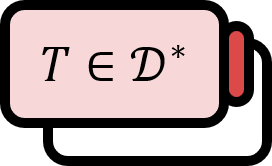Differentiation of Distributions
Buildup
The distribution cannot be differentiated in the same manner as functions defined over real numbers since its domain is a function space. However, for regular distributions, there is a corresponding locally integrable function $u\in L_{\mathrm{loc}}^{1}$, expressed as follows.
$$ T_{u}(\phi) =\int u(x)\phi (x) dx,\quad \phi \in \mathcal{D} $$
Hence, the action $S$ on $u$ could yield $Su=u^{\prime}$; if $u^{\prime}$ remains a locally integrable function, then there exists a corresponding distribution $T_{u^{\prime}}$. Therefore, the idea is to think of the action $S$ on $u$ as if it were the action on $T_{u}$. This idea is extended over all distributions to define the differentiation of distributions.
Below, we assume $u\in C^{\infty}$, although it’s not strictly necessary. You could also simply discuss up to the $n$th derivative with $u \in C^{n}$.
Let’s say a smooth function $u\in C^{\infty}$ is given. The test function $\phi$ has a compact support, so it’s harmless to assume that $u$ is defined over some compact set $K$ that contains the support of the test function. Since smooth functions on a compact set are locally integrable, we can consider the corresponding regular distribution $T_{u}$ for $u$.
Meanwhile, $u$, being a smooth function, is differentiable, and $u^{\prime}$, being locally integrable, has a corresponding regular distribution $T_{u^{\prime}}$. Thus, by applying the integration by parts to the test function $\phi \in \mathcal{D}$, it can be represented as follows.
$$ \begin{align*} T_{u^{\prime}}(\phi) &= \int u^{\prime}(x)\phi (x)dx \\ &= \left[ u(x) \phi (x) \right]_{-\infty}^{\infty} -\int u(x)\phi ^{\prime} (x) dx \end{align*} $$
Here, since $\phi$ has compact support, the first term is $0$. Hence, we obtain the following.
$$ T_{u^{\prime}}(\phi)=-\int u(x)\phi ^{\prime} (x) dx=-T_{u}(\phi^{\prime}) $$
Definition1
The derivative of the distribution $T$ is defined as follows.
$$ (DT)(\phi):= -T(D\phi) $$
Here, $D$ is the differentiation operator. For the multi-index $\alpha$, it is as follows.
$$ (D^{\alpha}T)(\phi):= \left| -1 \right|^{\left| \alpha \right| } T(D^{\alpha}\phi) $$
Since the derivative of a test function is also a test function, there is no problem with the domain, and apart from that aspect, it is simply multiplied by the constant term $\left| -1 \right|^{\left| \alpha \right|}$, thus $D^{\alpha}T$ is also a distribution. Of course, this can be proved using the definition of distributions, but it is not strictly necessary.
Gerald B. Folland, Fourier Analysis and Its Applications (1992), p308-309 ↩︎
